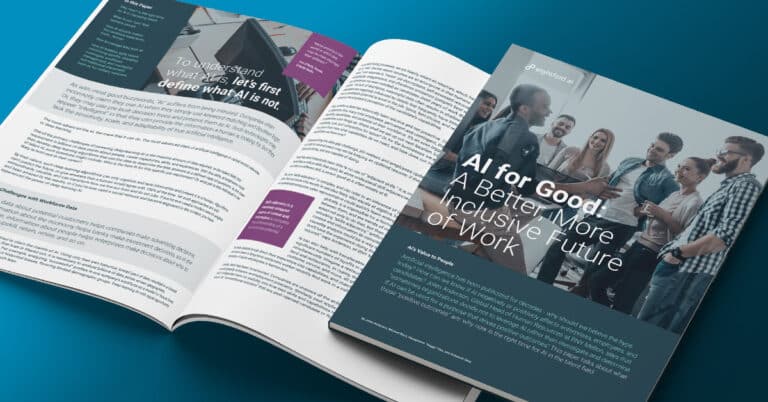AI helps people reach their potential and provide them with the careers they deserve. Yet, as Jolen Anderson of BNY Mellon described, artificial intelligence has the potential of being discarded due to misunderstanding of what it is and how it can be deployed.
This report talks about why now is the right time for AI to manage talent.
Find in this report:
- How AI can make the candidate experience more … human
- How to manage bias with AI
- How AI enables agile talent management, including the potential to minimize layoffs, manage contingent workforces, and manage nontraditional placement for underrepresented groups, including military veterans
AI in talent management: Overcoming workforce management flaws
The most advanced class of artificial intelligence is called neural networks or deep learning. Deep-learning AI requires a massive amount of data. In the talent field, this means billions of data points about people, career trajectories, skills, and experiences. With this data, AI engineers develop deep learning algorithms that use the data to determine the best answers to a defined class of questions. In the case of AI in talent management, such questions might include: Who is the best fit for this specific job requirement? Or, what job is this individual most likely to hold next in their career?
Algorithms can’t predict the future, or give answers that a human would agree with 100% of the time. Yet such approaches are still extraordinarily valuable, and can transform how we live our lives and do our jobs. If you’ve ever used a modern search engine and been amazed by the results, or have ever experienced the power of deep-learning AI.
AI in talent management prevents human biases
It uses bias-free algorithms.
Many company attempts to use their own historical data resulted in a biased output. For example, analyzing “successful” profiles in one company’s workforce as a model for future hires could reflect historical biases, favoring limited demographic groups. Deep learning AI in talent management can filter out any such bias with equal opportunity algorithms.
It replaces reliance on resumes.
‘In current hiring processes, we are heavily reliant on resumes. One key reason resumes are so error-prone is that humans are inherently bad at self-assessments. As candidates “tailor” their resumes to “match” job descriptions, self-assessed resume contents are full of platitudes, exaggerations, and oftentimes omissions (people’s best work and attributes are sometimes not even included) as candidates distill years of work down to a few bullet points. The lack of descriptive, meaningful data often results in shallow substitutes as employers are negatively influenced by details that frequently have little predictive insight into a candidate’s potential to excel in the job: typos, font choice, and resume layout influence the employer’s perception of the candidate’s capabilities.
It is more reliable than workforce data.
Companies struggle to determine such things as: Where shall we set up our next location, based on the availability, cost, and competition for talent? Or, for the businesses we anticipate being in two years from now, what capabilities do we need, and how does our need compare to the
capabilities we have now? Furthermore, job seekers and employees update information about themselves infrequently. A person at a job for several years may not be keeping an updated resume; if they are, it may capture only a fraction of what they have done, are doing, and are capable of doing.
Deep-learning talent management solutions capitalize on skill adjacency and transferable skill
The term “skills adjacency” can refer to an inference of unstated skills or the potential to learn a skill. For example, we can infer that someone who excels in calculus likely also excels at algebra, but the reverse is not necessarily true. With nearly 2 million unique skills globally, it is impossible for a human to understand all of them, let alone the correlations between them, and the trends of new and emerging skills. Recruiters today are being asked not only to do that, but then also map that against the needs of a job requisition. By unlocking “skills adjacency,” AI in talent management unlocks a massively untapped source of context and information to complete the understanding of a human’s true potential.
AI-powered talent management solutions can also help identify transferable skills. This is particularly valuable when there are significant numbers of layoffs in some industries, while other industries are expanding simultaneously. Imagine a restaurant manager out of work, thinking that all they know is food and restaurants. In reality, they likely know payroll, team building, inventory, budgeting, customer service, and more, all of which can be applied to another industry. AI can be used to help people break down their experience into capabilities, and match those with jobs needing to be filled now.
Deep-learning AI talent management solutions provide tools for recruiters and improve candidate experience
Humans are simply not capable of understanding massive volumes of data. We have historically supplemented an extremely narrow view of data with our own perceptions and limited understanding of the underlying skills required to successfully perform in jobs. AI can see potential, which helps both the candidate and the recruiter.
With AI, candidates can more transparently understand what skills and capabilities they possess in order to be a potential applicant for the role – visually demonstrating how their capabilities match up to the needs of the job. If a recruiter is looking for project-management skills, AI can see that a job candidate or current employee’s skills are “validated” or “likely” based on their experience — even though the candidate or employee has not had a title called “project manager” or listed project management on their resume. Or, similarly and equally valuable, AI can see that a candidate for a project-management job is missing the required skills despite holding prior project management titles.
Talent management solutions with deep-learning AI understand the passage of time
A human recruiter, seeing General Electric on a candidate’s resume, may think “GE is a good company to have worked for” without any further understanding. AI can know that a job in a certain team or department of GE during a certain time period was different than one on a different team or at a different time, offering a much more nuanced and valuable assessment of the candidate. AI can provide a completeness to data currently lacking for so many companies in their workforce-management practices.
AI provides visibility, examining large amounts of data and making the profiles of essentially every person dynamic. Take the example of an employee, job candidate—anyone—who does not regularly update their resume. They are nonetheless accumulating a trail of skills and experience: interview notes, performance reviews, social media footprints, online videos, and so on. AI can automatically enhance everyone’s profile by finding further details about a person and applying them to the profile, providing the knowledge that companies currently do not have as to the accomplishments of former candidates, former employees, and others.
AI in talent management – improving the internal talent management solution
AI in talent management improves internal mobility.
Artificial intelligence can help employees break down their experience into capabilities, and see what internal roles are available that match the need for those capabilities or what they can learn to pursue an aspirational role. An employee can even see what capabilities are needed for a role they aspire to, and pursue coursework if needed to prepare them for that internal role.
HR professionals and managers, too, can improve internal mobility through AI. Rather than waiting for the exit interview to determine why a person quit, they can reach out to people about internal roles where their capabilities fit. They can build succession plans showing which people have the potential to move up, using the AI that has measured the career trajectories of millions of people.
Using AI in talent management avoids layoffs.
With the use of artificial intelligence, companies can save jobs by placing employees who otherwise would have been let go in internal positions where their capabilities are a fit. The unique ability of AI to match people with opportunities at scale is especially important for avoiding layoffs.
AI in talent management makes non-traditional placement possible.
AI can help tremendously in taking those whose capabilities have been difficult to translate, and
finding them matching work. An infantry sergeant could have experience boosting morale and working with teams, as well as influencing and listening. This person could be a great salesperson whose capabilities are not being captured by military titles or even skills translators.
Talent management powered by AI effectively analyzes skill gaps.
Companies can deploy deep learning AI to gain a holistic view of the capabilities present within their current workforce, and compare their workforce capabilities against peer companies. AI can give a company visibility into what capabilities are needed to prepare for certain realities, what gaps exist in its current workforce, and how its capabilities compare to the capabilities of its competitors.











